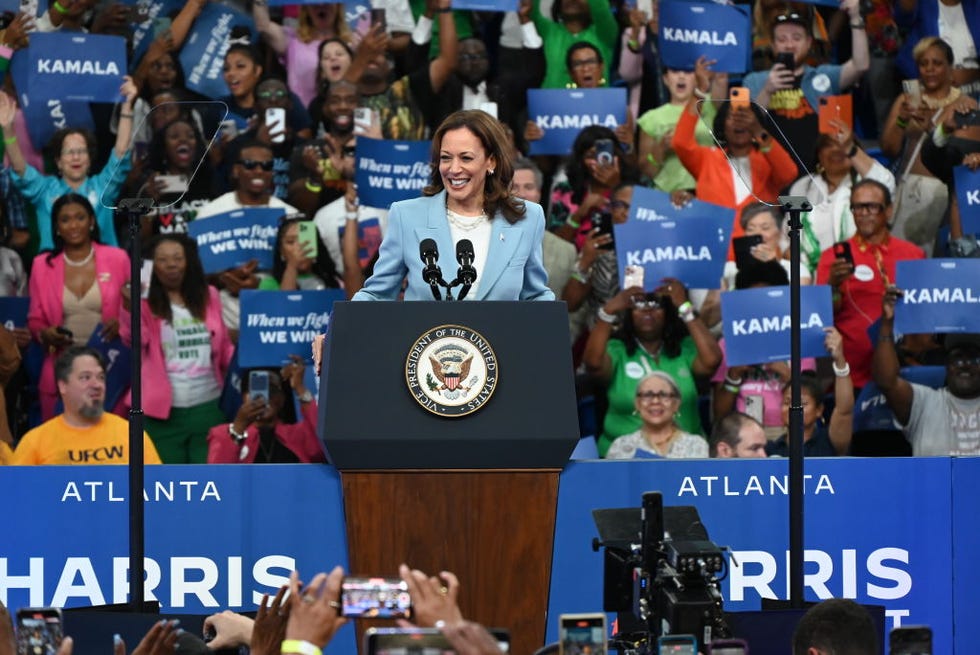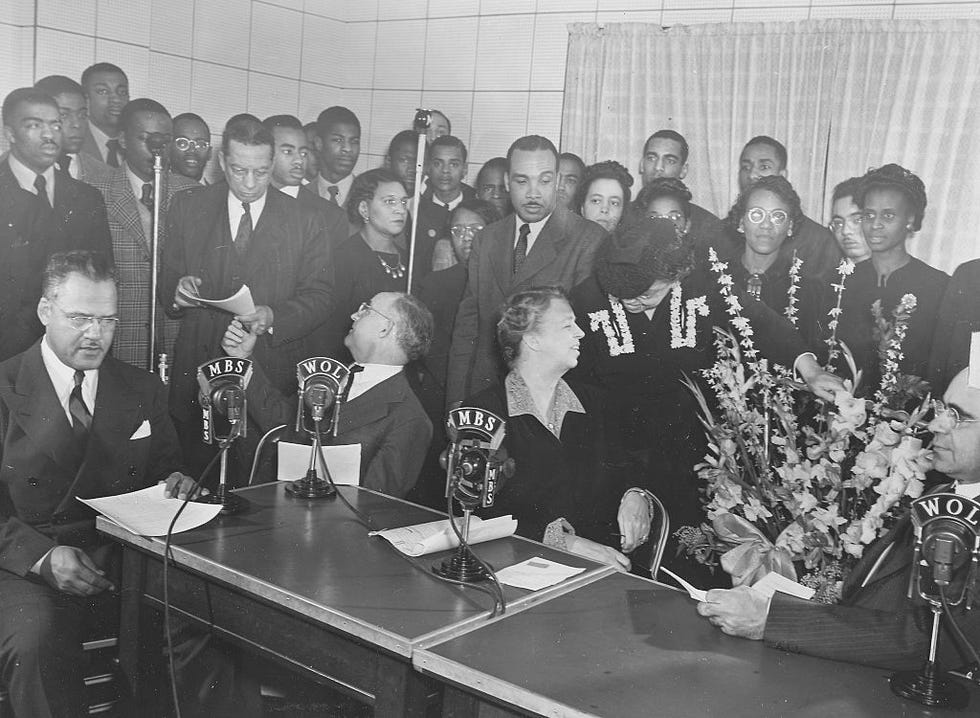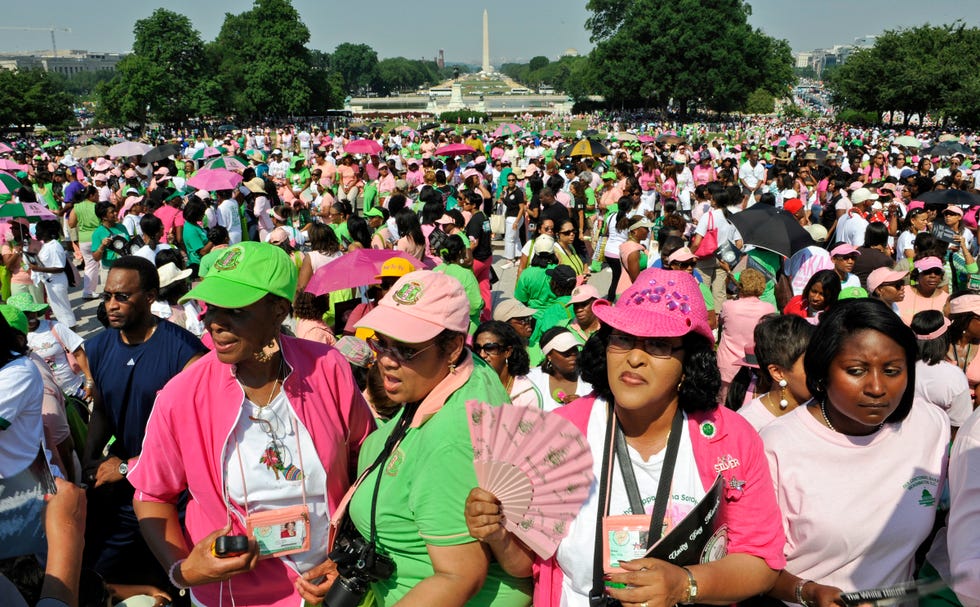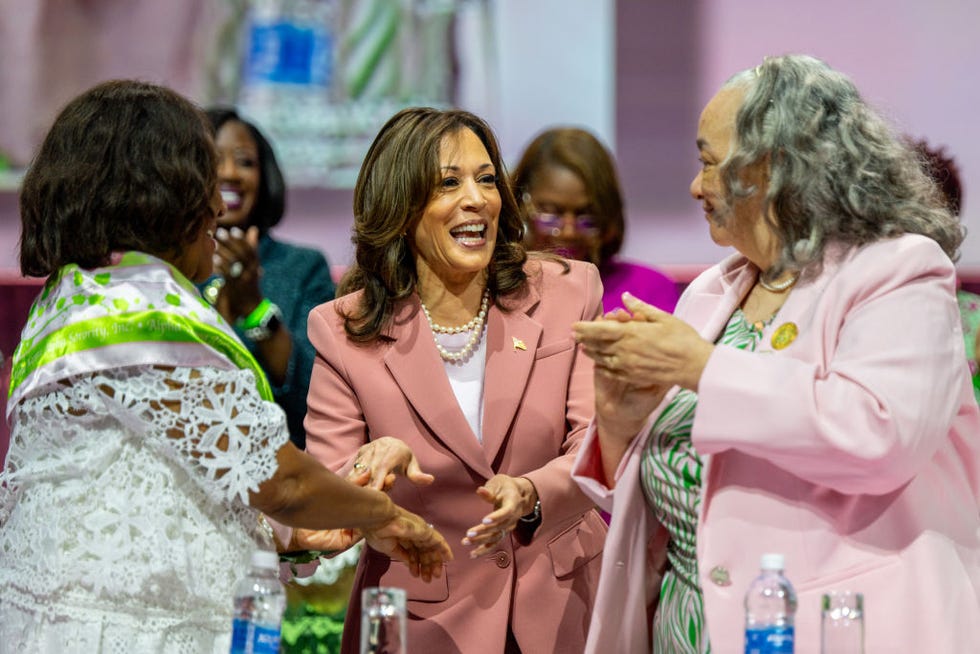Since becoming the Democratic Party’s presumptive nominees, Vice President Kamala Harris and her running mate, Tim Walz, have been holding campaign events in swing states across the country, gearing up for the Democratic National Convention in Chicago, which started yesterday and runs through August 22nd.
In photographs and video footage from nearly every rally stop, one can see Black women, clad in pink and green, standing in the coveted section behind the podium. These women are members of the Alpha Kappa Alpha sorority, an organization Harris joined in the 1980s while an undergraduate at Howard University. Harris is, perhaps, the most prominent member of the sorority, but its members also include the recently deceased congresswoman Sheila Jackson Lee, Althea Gibson, Toni Morrison, Wanda Sykes, and a host of honorary members, including Judge Constance Baker Motley, Coretta Scott King, Rosa Parks, Alicia Keys, Tracee Ellis Ross, and first lady Eleanor Roosevelt.
Harris is not the only member of a Black Greek letter organization running for president this cycle. Independent candidate Cornel West and his running mate, Melina Abdullah, are members of Alpha Phi Alpha and Alpha Kappa Alpha, respectively. When Harris launched her first bid for president, in 2019, many members of the mainstream media knew virtually nothing about African-American sororities and fraternities. Now that Harris has all but clinched her party’s nomination, Alpha Kappa Alpha and the eight other sororities and fraternities that comprise the National Pan-Hellenic Council, known as the Divine 9, have taken center stage in the political discourse.
The reality is that the Divine 9 have been involved in the electoral process since the early 20th century, though most of their political work has gone unnoticed outside the Black community or inside certain political circles. Any national attention the groups do receive typically comes during election cycles, when key social welfare issues that impact the Black community have the power to sway the result of the election. In recent years, think Bill Clinton’s 1992 election and Barack Obama’s two presidential bids, in particular his first run in 2008.
Alpha Kappa Alpha was founded in Howard University’s Miner Hall on January 15, 1908, by Ethel Hedgemon Lyle and eight other undergraduate women. There was no such sororal order for Black collegiate women at the time, and only one for Black men: Alpha Phi Alpha, which was founded at Cornell University in 1906. Over the next few decades, three other sororities—Delta Sigma Theta (1913), Zeta Phi Beta (1920), and Sigma Gamma Rho (1922)—and four other fraternities—Kappa Alpha Psi (1911), Omega Psi Phi (1911), Phi Beta Sigma (1914), and Iota Phi Theta (1963)—were founded, each with its own motto, symbols, and colors. Fueled in part by the Great Migration, chapters of these Black Greek letter organizations proliferated on both historically Black and predominantly white campuses, and there are alumni chapters in major cities across the country. Today there are more than 2 million members of the Divine 9 in chapters around the world; 360,000 of them are members of Alpha Kappa Alpha.
Social media offers a glimpse into the vibrant life of undergraduate Alpha Kappa Alpha chapters. Dazzling step shows, stroll competitions, scholarship pageants, and glossy videos announcing the chapter’s new initiates. And also their serious commitment to campus event programming. Howard’s Alpha chapter, which accepts anywhere from 50 to 100 new initiates a year, regularly hosts events on health and wellness and environmentalism. Spelman College’s Mu Pi chapter—where Zahara Jolie (daughter of Angelina Jolie) was initiated last November—is known for its social justice oriented events on issues such as reproductive rights and Black girls confronting the school to prison pipeline. Most chapters coordinate robust voter registration initiatives.
I joined Alpha Kappa Alpha—Tau chapter—in spring 2001, while an undergraduate at Indiana University–Bloomington. My family has strong generational ties to the Divine 9; with seven of the nine organizations represented. I wanted to continue the legacy. I also loved the fact that many of the thinkers I respected were also part of the Divine 9: W.E.B. DuBois, Louise Thompson Patterson, Zora Neale Hurston, Bayard Rustin, Gloria Richardson, and Shirley Chisholm—the first Black person to seek the presidential nomination from a major political party. I admired that these organizations had been incubators for differing, and even contradictory, strains of Black political thought and social action.
“Black people actually had a vision of what they wanted through the structure of fraternalism,” Alpha Phi Alpha member Lawrence Ross, author of The Divine Nine: The History of Black Fraternities and Sororities and a partner at the Metaphor Club in Los Angeles told me in a recent Zoom interview. “In order for Black social fraternities to really have a reason for existing, they have to be connected to moving the community forward.” The Divine 9’s founders were largely children of the Black middle class, since most poor and working-class African Americans did not have access to a college education in the early 20th century. There was an expectation that these early organizers would reproduce the rules and customs of their social class, but members quickly realized they also needed to cultivate a social justice element in their organizations to address the urgent needs of the Black community living under the brutal Jim Crow regime.
Alpha Kappa Alpha and the larger Divine 9 became training grounds for civic- and justice-minded student leaders. In the 1920s student members agitated for full enfranchisement, the passage of anti-lynching legislation, and comprehensive education for black children. National programming initiatives within and across Divine 9 organizations were amplified during the Depression, and they provided social services for Black populations that New Deal programs neglected. In 1935 Alpha Kappa Alpha launched its Mississippi Health Project to provide health services to impoverished people living in the belly of Southern racial terror. The sorority extended its work in 1938, creating a nonpartisan council that lobbied on Capitol Hill for civil and democratic rights. Some Divine 9 members even organized informally as a “Black cabinet” for presidents Franklin D. Roosevelt and Harry S. Truman, hoping to influence federal policies on race relations.
After World War II, “Help Week” initiatives replaced the notorious Hell Week practices that had become synonymous with Greek life on American college campuses. Help Weeks enabled Divine 9 chapters to implement their various national programming initiatives through service-oriented events and fundraisers that appealed to young people and promoted mutual aid and political engagement. This shift in focus also coincided with the emergence of a more class-stratified membership across organizations, as more working-class African-Americans gained access to a college education. And with this heterogeneous membership came an even greater range of political ideas and strategies, fueling the student sit-in movement, Freedom Rides, and the Freedom Summer voter registration project during the Civil Rights Movement.
At the national level, Divine 9 organizations collaborated to amplify voter registration drives in swing states and supported campaigns led by Dr. Martin Luther King Jr., a member of Alpha Phi Alpha. They also established the American Council on Human Rights—an outgrowth of Alpha Kappa Alpha’s nonpartisan council—which was instrumental in getting the Civil Rights Act of 1964 passed.
Although Divine 9 members have often united around similar goals, they have never operated as a monolith. Some members, such as Black Panther Party co-founder Huey P. Newton, a member of Phi Beta Sigma, endorsed a more revolutionary route to freedom. Others demonstrated that one could be Greek without adopting the bourgeois elitism some felt the organizations reproduced. Many leftist Divine 9 members believed that working within a two-party political system would never free Black Americans from the shackles of capitalism and white supremacy. Some focused on radical grassroots organizing—beyond the purview of the Divine 9. Others ultimately disassociated themselves altogether from the organizations.
Organizers who were also members of the Divine 9 have been active during the anti–Vietnam War movement, the anti-apartheid movement of the 1980s and ’90s, the Black Lives Matter movement of the 2010s, and the protests against the war in Gaza earlier this year.
“That connection—between what we saw in the 1920s forward to where we are today—of young people standing up, that’s what makes the long arc of history of these organizations so crucial,” Alpha Kappa Alpha member Khalilah Brown-Dean, the Rosenthal Professor of Civic Engagement and executive director of the Albritton Center at Wesleyan University, told me during a phone interview.
Ross concurs. “It doesn’t mean the Divine 9 is perfect, but we know what we can do. This election cycle is going to be a testament to that.” Divine 9 organizations cannot endorse political candidates due to their 501(c)(7) tax status. In July, however, the Divine 9 Council of Presidents released a statement on social media, declaring that the groups would “meet this critical moment in history with an unprecedented voter registration, education, and mobilization coordinated campaign” that builds upon “our shared legacies of social action and service to our communities.”
Black Greek letter organizations are a powerful constituency that no candidate can afford to ignore, in large part because of the political diversity they represent and their ties to a broad swath of the African-American community. There’s a concentration of power within Divine 9 organizations in the South, where a large African-American contingent still lives and where the majority of HBCUs are located. Alpha Kappa Alpha has 427 chapters in states it designates as the South. These states are critical in every election. “There’s a natural connection between the programmatic priorities of [the Divine 9] and the politics at stake in this election,” says Brown-Dean.
Savvy candidates understand they must work to earn Divine 9 votes. Black women in these organizations drive political change. This past July, Vice President Harris gave speeches at the 71st Alpha Kappa Alpha Boule, Zeta Phi Beta’s national convention, and Sigma Gamma Rho’s Biennial Boule. She also spent time last week on Howard’s campus, welcoming incoming students. “I keep laughing at the GOP, because I’m like ‘Y’all have no idea what happens when you get motivated Black women to do stuff,’” says Ross. However, no candidate—even one who is a member of the Divine 9—should consider them a monolithic voting bloc. Every vote must be earned. “Just as we challenge each other, we should be challenging people who want our sacred vote,” Brown-Dean says.

Tanisha C. Ford is a history professor at the Graduate Center, CUNY. She is also the author of several books, including Our Secret Society: Mollie Moon and the Glamour, Money, and Power Behind the Civil Rights Movement.






